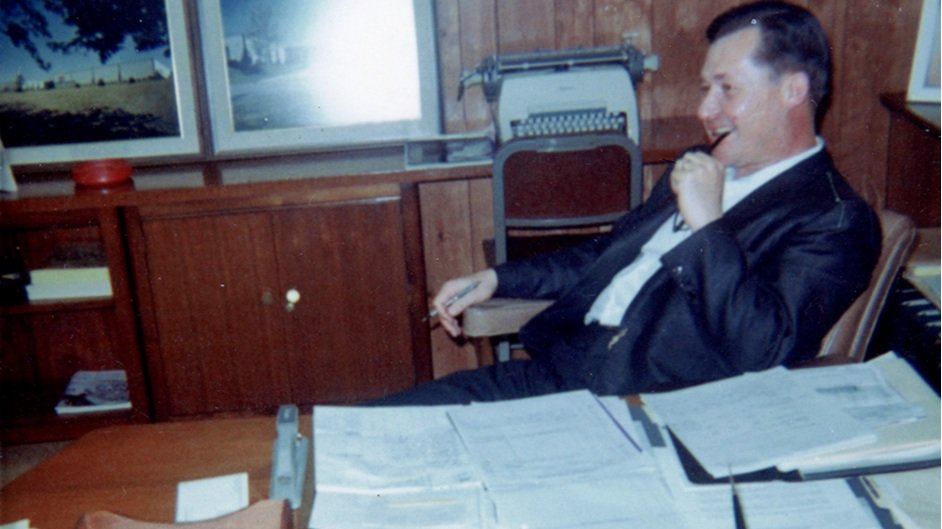
Closing Chapter
After All is Said & Done
Woodworkers are made — not born — but they must have the talent for it.
I very well remember what my old high school principal told me at my graduation in 1939:
“‘Tain’t by fashion, form, nor state —but it’s git up ‘n git that makes you great.”
I remember those words because I really needed to hear them. After growing up on a Missouri farm, during the Great Depression, I sorely needed some kind of encouragement.

“Nothing said that I was going to end up being a woodworker. I went off to Kansas University, absolutely certain I was going to be an accountant. After taking Economics I, I knew better.”
Nothing said that I was going to end up being a woodworker. I went off to Kansas University, absolutely certain I was going to be an accountant. After taking Economics I, I knew better.
I wasn’t supposed to be a woodworker just because my great-grandfathers made their living at it. The few tools that passed down to me may have had an effect—but I didn’t really appreciate them until after I had become a woodworker of my own volition.
My father was a breeder of live-stock. The only woodworking he ever did was to build gates to keep the cattle from getting out. Plus a couple houses, I recall.
It comes down, I think, to “What do you really want to do with your life?” And, “How badly do you want to do it?”

“I had built a fine career, writing copy in the largest advertising agencies in the world. But, as I said at the beginning of this book, my hobby took me over. I was ready for it, partly because I despised the “big organization” and the gray-flannel-suits and because I had become addicted to wood—its feel, its smell, its beauty, its challenge. I both sought and found a way to “jump off the cliff”!”
I had built a fine career, writing copy in the largest advertising agencies in the world. But, as I said at the beginning of this book, my hobby took me over. I was ready for it, partly because I despised the “big organization” and the gray-flannel-suits and because I had become addicted to wood—its feel, its smell, its beauty, its challenge. I both sought and found a way to “jump off the cliff”!
With a brand-new house which I had mostly built myself (and still not finished), filled with kids which were also of my doing (and still not finished), I well remember the very day I decided to walk out of my first career—and enter my second.
I have never made a better decision.
I believe that anybody, with a serious attitude and an intense desire to perform, can be a fine woodworker.
However, I believe the industry, itself, has failed the potential newcomer to this proud endeavor. The old-timers have kept their secrets “too close to their vests”— while the larger shops have gone to hi-tech methods of tape-controlled equipment and 32-mm cabinetry. They’ve turned a new generation of workers (not woodworkers) into uneducated cogs in their production wheel. Though the new methods are good and necessary, they have failed to train these “youngsters” in the age-old techniques that make our business exciting. The truth is, too many bosses, themselves, don’t know the difference between a chisel and a screwdriver.
For all kinds of other reasons, things are not going to change. Not only do we lack teachers with the knowledge of pure woodworking—but our youngsters may also lack the desire. Not just for woodworking. For anything!
I would like to see every man who KNOWS that he knows woodworking—start a school. At least take a young person under his wing. Instead of building fine cabinets and furniture, alone, and for his own satisfaction, why can’t he excite a small world of would-be woodworkers to join him. There’s a lot to be learned—together.
Students are competition. To work alone is to be without competition. The mind is never so sharp, the concentration so good, or the product so fine—as when a student is watching your every move.
I think of parents who came into our school and asked, “Do you think you can do anything with our boy?”
Sometimes I could. Sometimes it was impossible. I remember one fellow who, every time I spread out newspapers to protect my work-bench, he’d read every word—even if it was old news. Every word. And he completely forgot why he was even there.
He didn’t last long.
But I remember others who became truly fine craftsmen and in the business today as successful cabinetmakers. Because I know their beginnings, I wonder what they would be doing if they hadn’t “found themselves”.
Part of the training has to do with making money at this game. A crass statement—but true.
It isn’t enough to do exemplary work. It isn’t enough to enjoy doing exemplary work. This woodworking business may be a fascinating undertaking but there is something very human about a woodworker. He needs to eat three good meals a day, live like a proud person, and enjoy the benefits of a well-ordered family life. Oddly enough, such things don’t happen by themselves.
They result from demanding respect.
He must learn that he is not a serf to every king that comes along. He must learn he cannot build his business on “cheap” customers. He must learn that doctors and lawyers, especially lawyers, love to forget the “last payment”. And they also never remember it!
He must get at least 50% up front—or it isn’t a job. He must realize that the mechanic who works on his car gets paid a very nice rate. Then he must remember to add 10% for coffee. And if the customer has an Interior Decorator, add on at least 10% more. Maybe 20%. (Better yet, don’t take the job.)
The only person who can make these decisions is the craftsman himself. To work one’s heart out, knowing you’re losing money, is an experience needed only ONCE.
The day is coming, (actually it’s here!), when there will be no classes of people between those who have the BIG money—and us! I’ve watched it happen—and we have to deal with it.
I’ve urged my sons, over the years, to choose their customers. Do not let them choose you! It’s the easiest thing in the world to work for somebody who can’t afford you—when the truth is: You can’t afford them.
At the outset, it may be tough to persist. But the day will come when the serious woodworker develops his “own kind of market”—the kind that knows quality and will pay for it. In that same time, he has improved his abilities to satisfy those who deserve his best efforts.
Most of all, the woodworker must think more highly of himself than anybody else will ever think of him. He must study the history of his profession. He must become profound with his knowledge of old techniques, periods of furniture, what makes one design better than another. PROFOUND, not for the purpose of extolling facts and sounding or looking good—but for the simple, solid satisfaction of “being right”.
Neither is it a requisite that he be a designer. Not at all. The old, proven, indomitable designs will always be great. Learn to copy! Then improve. Constantly look for a way to improve, mostly in your own prowess as a woodworker.
To copy a contemporary design is like the “blind leading the blind”. It hasn’t passed the test of time. If you doubt whether that’s true, design something—then wait around for a couple hundred years and see how it turns out.
Copying is many times better.
I always say, “If you’re going to steal, at least steal from the king—not his vassal!”
So what does it all come down to? I’ll tell you: ATTITUDE.
Your damnable, persistent, undaunted attitude will make a full-fledged woodworker out of you. It’s the same thing that makes anybody, of any profession, better than others.
The nicest thing about working with wood? I can’t imagine wanting any other profession than this. It’s clean. It’s natural. It’s a very human way to make a living. And it’s full of nice people. What more can you want?
I wish you well. I wish you happiness. I wish you the pleasure of building your “masterpiece”, and standing back in awe of yourself, and signing your name in an unlikely place for some future owner to discover and admire. And envy.
I tell you—it’s better than a tombstone.
I’ve said that for so many years I’m about to find out.

For those who don’t know, our friend Mr. Sawdust — Wallace Kunkel — passed away in 1997. We’ve put together a page to say a bit more on that…
